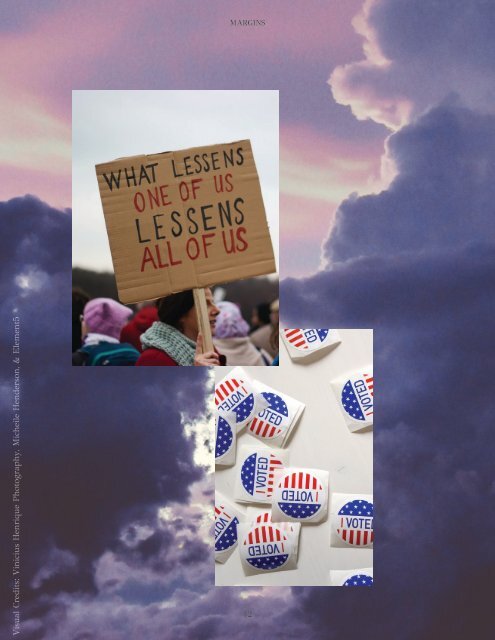Margins Magazine - Volume 3 Issue 1
2020 has been a year of immense change and upheaval thus far, with our idea around what is normal challenged in the midst of a pandemic. In this midst of these volatile times, our team at Margins Magazine has come together to create Volume 3 Issue 1 of our publication, revolving around the theme of CHANGE. In this issue, our writers have worked hard to bring you pieces that critically discuss the realities of the current moment from advocacy effort across different fields to issues such as domestic violence and colourist. At #UTSC, we connect with Radio FWD and UTERN at UTSC to learn how campus groups are affected during the pandemic and how they are evolving their programming while staying connected with students. We’ve received amazing creative submissions from members of our local community and around the world that have allowed us to curate this issue with stories that truly represent the heart, soul, and pulse of the current times. Bringing together all these voices in Margins has been a true labour of love. We truly hope that the stories, words, and art within Margins resonate with you. Follow us on Instagram @wtcmargins & LinkedIn https://www.linkedin.com/company/margins-magazine!
2020 has been a year of immense change and upheaval thus far, with our idea around what is normal challenged in the midst of a pandemic. In this midst of these volatile times, our team at Margins Magazine has come together to create Volume 3 Issue 1 of our publication, revolving around the theme of CHANGE.
In this issue, our writers have worked hard to bring you pieces that critically discuss the realities of the current moment from advocacy effort across different fields to issues such as domestic violence and colourist. At #UTSC, we connect with Radio FWD and UTERN at UTSC to learn how campus groups are affected during the pandemic and how they are evolving their programming while staying connected with students.
We’ve received amazing creative submissions from members of our local community and around the world that have allowed us to curate this issue with stories that truly represent the heart, soul, and pulse of the current times.
Bringing together all these voices in Margins has been a true labour of love. We truly hope that the stories, words, and art within Margins resonate with you.
Follow us on Instagram @wtcmargins & LinkedIn https://www.linkedin.com/company/margins-magazine!
You also want an ePaper? Increase the reach of your titles
YUMPU automatically turns print PDFs into web optimized ePapers that Google loves.
MARGINS<br />
MARGINS<br />
Visual Credits: Vinicius Henrique Photography, Micheile Henderson, & Element5<br />
During this time, it is common for people to<br />
experience increased levels of distress and anxiety<br />
as a result of social isolation. It becomes difficult<br />
to navigate the negative mental health effects and<br />
strive to balance normalizing the new normal and<br />
adapting to the new environment of advocacy. A<br />
quote popularly used when addressing activism<br />
burnout said by mental health advocate Kristin<br />
Keim is "rest is not the enemy of change. It is one<br />
part of its fuel." The combination of the resurgence<br />
of the BLM movement and the stress of social<br />
isolation has led to a hybrid mental health crisis<br />
amongst many advocates, allies, and people of<br />
colour. The later of this article explores strategies<br />
and resources for managing mental well-being<br />
while part-taking in the BLM movement.<br />
Addressing Burnout<br />
Being socially distant while unlearning and<br />
recognizing systemic racism has exacerbated<br />
feelings of hopelessness and guilt. In addition<br />
to trying to navigate these political and social<br />
injustices, activists are trying to cope with their<br />
struggles amid a pandemic. Sustaining the<br />
energy and passion on some days can be difficult.<br />
Advocacy burnout referred to the long term, the<br />
accumulative and debilitating impact of activismrelated<br />
stress (Chen et al. 4). As we are all learning<br />
new methods to advocate for ourselves, our peers,<br />
and our communities. Different people have<br />
different strategies for managing burnout, a few<br />
useful examples include:<br />
• Taking breaks in-between big projects:<br />
whether you are reading books, listening to<br />
podcasts, or creating advocacy content, it is<br />
important to avoid jumping from a project<br />
to the next. Doing so will allow you to give<br />
your mind and body a chance to recover.<br />
12 13<br />
• Schedule time for yourself each day: this<br />
might look like taking a couple of minutes<br />
to turn off your phone and other devices,<br />
participating in meditative and breathing<br />
exercises to release the muscle tension in<br />
your body. (Katz Ressler) I love grabbing a<br />
snack and enjoying some funny YouTube or<br />
Tiktok videos.<br />
• SLEEP: When you are well-rested, you will<br />
have more patience, clarity of thought, and<br />
the ability to focus. A great way to develop<br />
a habit of resting and sleep could be to have<br />
a night-time routine- like developing and<br />
investing in a skincare routine!<br />
• Take time to reflect: Whether it's journaling<br />
alone or speaking with a friend, having time<br />
to think about the things you're doing is so<br />
important. This will allow you to identify<br />
your feelings and their underlying causes.<br />
This allows yourself to assess your emotions<br />
and figure out what your next steps are<br />
while prioritizing your mental and physical<br />
wellbeing.<br />
• Separate yourself from the issue:<br />
channeling your passions and devoting your<br />
efforts to a case is extremely admirable. At<br />
the same time, with that much investment to<br />
an issue, there is a risk of tying your selfworth<br />
to the success, progress, and failure<br />
of your cause. You are you, and you are still<br />
human. It is important to use your feelings as<br />
fuel for advocacy but also as an indicator for<br />
when to take a step back and recharge.<br />
• Celebrate the little victories: build on the<br />
little successes and enjoy the low hanging<br />
fruit. These moments are a part of building<br />
momentum for the long journey.
















